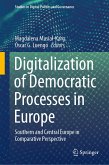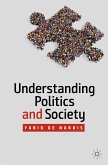This book is explicitly modernist at a time when many scholars have either forgotten the emancipatory promise of the Enlightenment or railed against it in the name of postmodernism. The book, broadly, adopts a hybrid epistemology that utilises the critical insights of Geisteswissenschaften Tradition (Weberian 'Ideal-Type Analysis') and the Habermas (1988) notions of the 'public sphere' and deliberative/dialogic democracy ('ideal speech') to advance a general proposition of democratic renewal by way of cyberdemocracy. Curiously, as democracy spreads across the world in the age of globalisation, it has also been accompanied by increased discontent with democratic systems. To that end, this book is not overly concerned with saving democracy beyond the liberal representative model, rather the focus is on how modern representative democracy has failed and how cyberdemocracy might function as a more effective model that truly represents the people by broadening participation and reflexive deliberation.
Harem Karem has recently obtained his Ph.D. in the United Kingdom. He is currently the executive director of a national NGO that focuses on research, training, and media. Formerly, Harem worked as a journalist covering the Middle East and worked as a researcher with a particular focus on democracy and elections.
Dieser Download kann aus rechtlichen Gründen nur mit Rechnungsadresse in A, B, BG, CY, CZ, D, DK, EW, E, FIN, F, GR, HR, H, IRL, I, LT, L, LR, M, NL, PL, P, R, S, SLO, SK ausgeliefert werden.
Es gelten unsere Allgemeinen Geschäftsbedingungen: www.buecher.de/agb
Impressum
www.buecher.de ist ein Internetauftritt der buecher.de internetstores GmbH
Geschäftsführung: Monica Sawhney | Roland Kölbl | Günter Hilger
Sitz der Gesellschaft: Batheyer Straße 115 - 117, 58099 Hagen
Postanschrift: Bürgermeister-Wegele-Str. 12, 86167 Augsburg
Amtsgericht Hagen HRB 13257
Steuernummer: 321/5800/1497
USt-IdNr: DE450055826
Bitte wählen Sie Ihr Anliegen aus.
Rechnungen
Retourenschein anfordern
Bestellstatus
Storno









